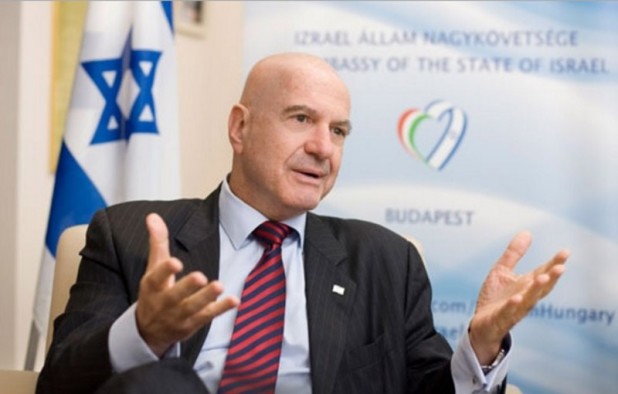The New Observer
April 24, 2016
Israel’s ambassador to Hungary has blasted Zsolt Bayer, the co-founder of Hungary’s ruling Fidesz party, for writing a series of articles blaming Jews for communism, which say that Jews cause anti-Semitism by their behavior, and for quoting “anti-Semitic writings.”
The ambassador, Ilan Mor, said that Bayer’s articles in the Fidesz-supporting mass circulation newspaper Magyar Hirlap, “totally contradict the official statements and positions of the Government of Hungary, which implements a policy of friendship and cooperation” with Israel.
Ilan Mor, Israeli ambassador to Hungary.
Making the comments in an April 4 letter to Peter Petan, editor-in-chief of Magyar Hirlap, Mor said Bayer was guilty of “openly advocating anti-Semitic sentiments and incitement against the Jewish People and the State of Israel.”
Existence of the letter was revealed by the Budapest Jewish weekly newspaper, Szombat, which carried its full text.
In the letter, Mor said he was “deeply shocked” to read Bayer’s articles, now numbering 14 in total, written under the title “Intolerable.”
The series examined the origins of anti-Semitism in Hungary, and said that it was a “natural reaction to actions by Jews against non-Jews.”
Zsolt Bayer, co-founder of Hungary’s Fidesz party, and personal friend of Viktor Orban.
In number “3” of his articles, Bayer linked the persecution of Jews during World War II to the Jewish involvement in the Hungarian Soviet Republic of 1919.
This Hungarian Soviet republic, modelled on the Soviet Union, was led by the Jew Bela Kun (Cohen). After a short reign of terror, Kun/Cohen was overthrown, and fled to the Soviet Union. Bayer then pointed out that this experience of Jews was one of the primary causes of anti-Semitism in Hungary:
“Why are we surprised that the simple peasant whose determinant experience was that the Jews broke into his village, beat his priest to death, threatened to convert his church into a movie theater—why do we find it shocking that twenty years later he watched without pity as the gendarmes dragged the Jews away from his village?” Bayer wrote.
Mor’s letter specifically mentioned article numbers “10” and “14” of Bayer’s article series as being the primary offenders.
In article number “10,” Bayer revealed Jewish double standards when it comes to war criminals. Noting that the Jews were indeed persecuted by the Nazis, he says that “Nazi victims and communist criminals have a large commonality: the Jews.”
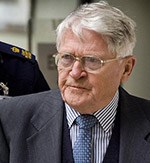 He then discusses two test cases: the Hungarian national Charles Zentai (born Károly Steiner), who served in the Hungarian army in World War II and was a member of the Arrow Cross party at the time, and the Polish Jew Salomon Morel, a communist who was a member of the postwar Communist Party and secret police.
He then discusses two test cases: the Hungarian national Charles Zentai (born Károly Steiner), who served in the Hungarian army in World War II and was a member of the Arrow Cross party at the time, and the Polish Jew Salomon Morel, a communist who was a member of the postwar Communist Party and secret police.
Zentai was accused by Israel and the Simon Wiesenthal Center of murdering a Jew in November 1944.
The Wiesenthal Center led an international effort to get Zentai—at age 86—extradited to Hungary from Australia, where he had been living since the end of the war, to stand trial.
Eventually, after six years of ongoing court cases in Australia, the Jewish extradition efforts collapsed after evidence showed that another person had been convicted of the murder in 1948 already, and that the hounding of Zentai had been completely invented.
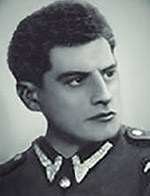 Morel, on the other hand, as Bayer pointed out, was a Jewish partisan, Stalinist official, and war criminal. After the end of World War II, Morel became commander of the Zgoda labor camp in Swietochlowice, the former German town of Schwingen in Silesia (now in Poland).
Morel, on the other hand, as Bayer pointed out, was a Jewish partisan, Stalinist official, and war criminal. After the end of World War II, Morel became commander of the Zgoda labor camp in Swietochlowice, the former German town of Schwingen in Silesia (now in Poland).
While commander of the labor camp, Morel committed a large number of murders and crimes, eventually racking up at least 1,500 murders of Polish and German civilians to his name. At the same time, he was a leading member of the Polish United Workers’ Party (Polska Zjednoczona Partia Robotnicza, PZPR), the Communist party which governed Poland from 1948 to 1989. Morel also acquired the rank of colonel in the Communist state’s secret political police, or MBP.
In 1994, after the dissolution of the Soviet Union, Morel was indicted by Poland’s Institute of National Remembrance for war crimes and crimes against humanity, including the killings in Swietochlowice.
Morel immediately fled to Israel and was granted citizenship under that country’s Law of Return. Poland twice requested his extradition, but Israel refused to extradite him, and he died peacefully in 2007 in the Jewish homeland.
Bayer pointed out that when a Gentile was (falsely) accused of “war crimes” by Jews, he was persecuted for years—but when a Jew is (accurately) accused of “war crimes,” then Israel granted him safe haven and a pension to live out his life in peace.
Comparing the treatment meted out to Zentai to that given to Morel, Bayer concluded that “Jews have a double standard when it comes to those accused of crimes committed against humanity.”
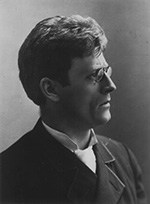 In “number 14” of his articles, Bayer discussed Israel’s objections to the state of Norway celebrating the works of famous Norwegian writer and Nobel laureate, Knut Hamsun.
In “number 14” of his articles, Bayer discussed Israel’s objections to the state of Norway celebrating the works of famous Norwegian writer and Nobel laureate, Knut Hamsun.
Hamsun—most famous for his novels such as Hunger (1890), Mysteries (1892), Pan (1894), and Victoria (1898)—was also an avowed Nazi sympathizer who issued a famous eulogy upon Hitler’s death in 1945, writing in the Aftenposten newspaper of May 7, 1945, that the German leader was “a warrior for mankind and a preacher of the gospel of justice for all nations. He was a reforming character of the highest order, and his historical fate was that he functioned in a time of unequalled brutality, which in the end felled him. Thus may the ordinary Western European look at Adolf Hitler. And we, his close followers, bow our heads at his death.”
Hamsun’s contributions to Norwegian literature are so towering that he was “rehabilitated” after the war, and an official Hamsun Society was established.
Bayer goes on to point out that Norway has eleven town squares and streets named after him, and he is celebrated by an additional nine statues, monuments, or memorial plaques.
The Norwegian national bank has a silver medal with his image, and the Norwegian government built a memorial museum in 2009 to honor him.
It was the latter move, Bayer wrote, which caused “the Jews to immediately begin to protest. The case also stirred a diplomatic scandal, with [Israeli] Foreign Minister Avigdor Lieberman officially protesting the anniversary of the writer’s birth celebrations at the museum.”
Bayer said that the Norwegian government had responded to the Israeli protests by sending them a note saying that it was possible to celebrate a writer without accepting their political views.
“In this spirit, it was decided to keep the official commemorations,” Bayer wrote, adding that it was worthwhile “for us to heed this. It is possible not only for writers, but also for historians, to distinguish between a work and its creator’s political activities.”
He then went on to make the statement which gave so much offence:
“And it’s time to break with others who want to write the canon and tell us what to think and what not to read.”
It was thus not surprising that in his letter, Mor wrote that the Israeli embassy was, with immediate effect, cancelling its subscription to Magyar Hirlap.
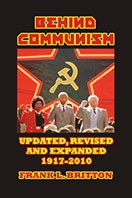 Recommended reading: Behind Communism 1917–2010.
Recommended reading: Behind Communism 1917–2010.
By Frank L Britton. Updated, revised, and expanded 1917–2010.
The most extensively researched book ever to see the light of day concerning Jewish involvement in Communism, the Soviet Union, and Communist movements around the globe.
Includes sections on postwar Communist movements in Eastern Europe, Britain, America, South Africa, and China. Click here for details.
 Daily Stormer The Most Censored Publication in History
Daily Stormer The Most Censored Publication in History
